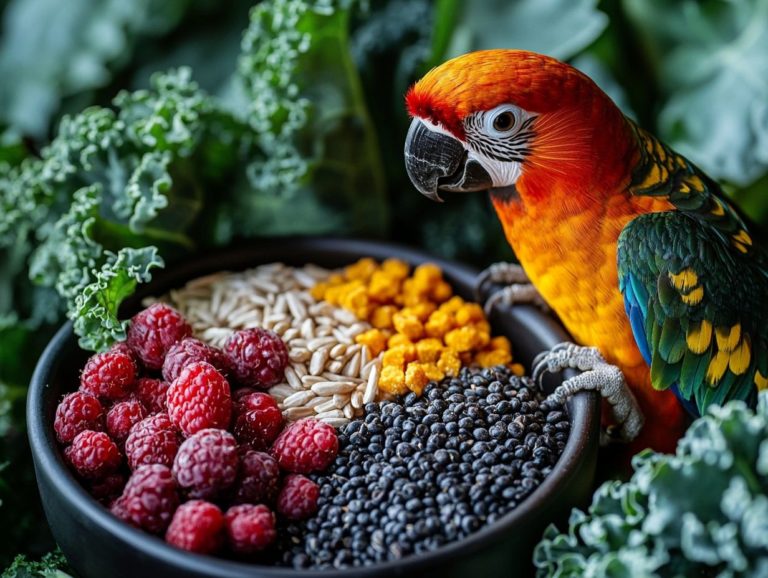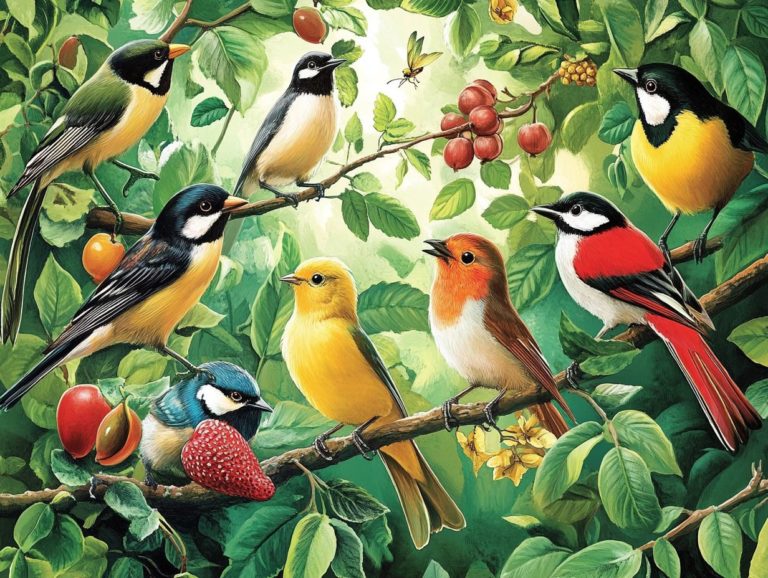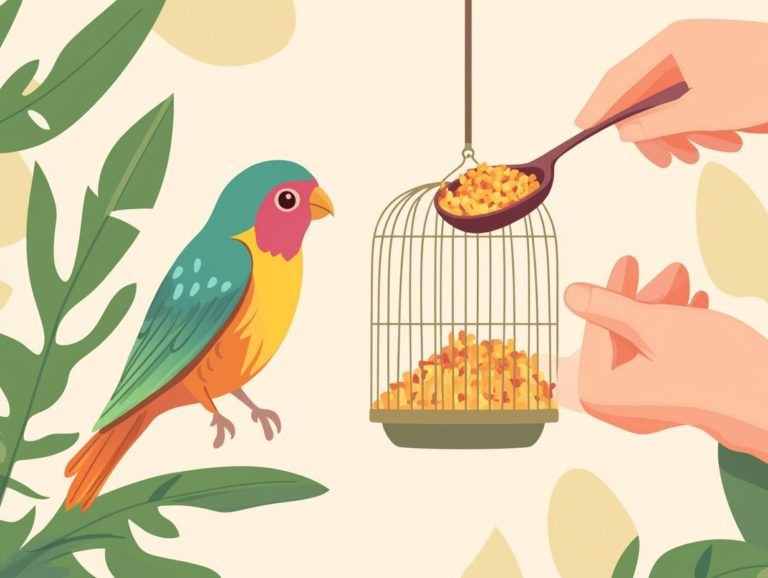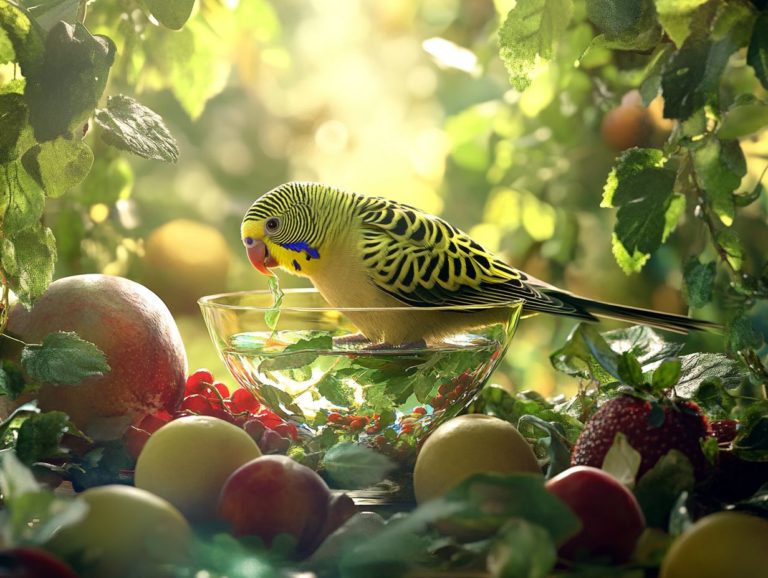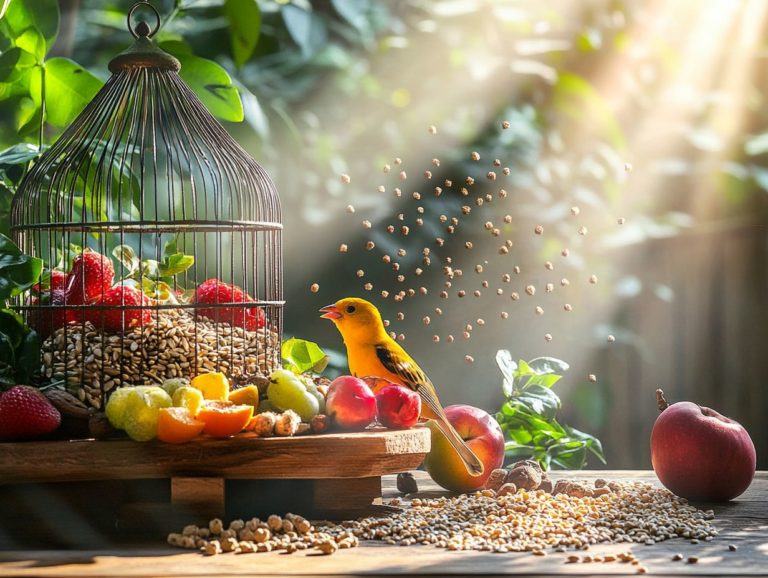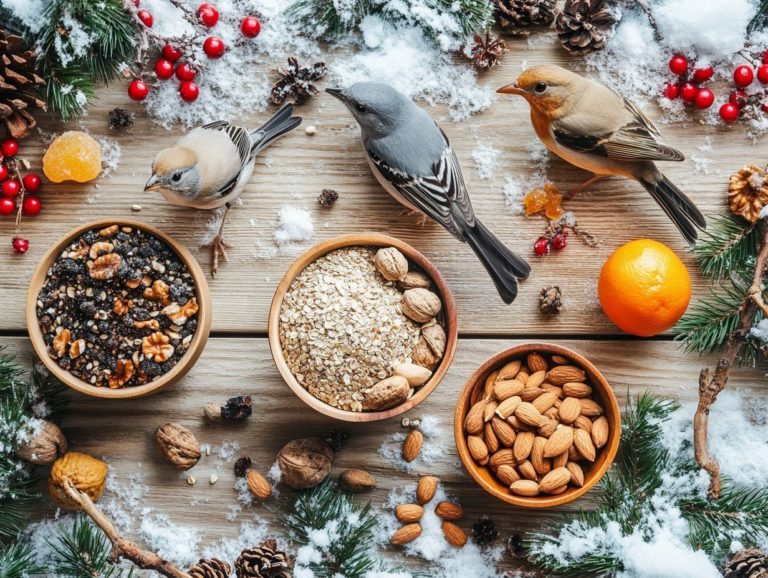How to Create a Feeding Schedule for Your Bird
Feeding your feathered friend involves more than just topping off their bowl. It’s about understanding their unique dietary needs for a long, healthy life.
From identifying the nutritional requirements specific to various bird species to designing a balanced diet brimming with essential nutrients, including fresh fruits and vegetables, this guide includes everything you need to know.
You ll discover how to establish an effective feeding schedule tailored to your bird s age, size, and activity level. This is vital for their long-term health and happiness.
We ll also highlight common feeding pitfalls to avoid.
Get ready to turn your bird’s mealtime into a rewarding experience!
Contents
- Key Takeaways:
- Understanding Your Bird’s Dietary Needs
- Creating a Balanced Diet for Your Bird
- Factors to Consider When Creating a Feeding Schedule
- Sample Feeding Schedule for Different Types of Birds
- Tips for Maintaining a Healthy Feeding Schedule
- Common Mistakes to Avoid When Feeding Your Bird
- Frequently Asked Questions
- What is a feeding schedule for a bird?
- Why is it important to create a feeding schedule for my bird?
- How do I determine how much and how often to feed my bird?
Key Takeaways:
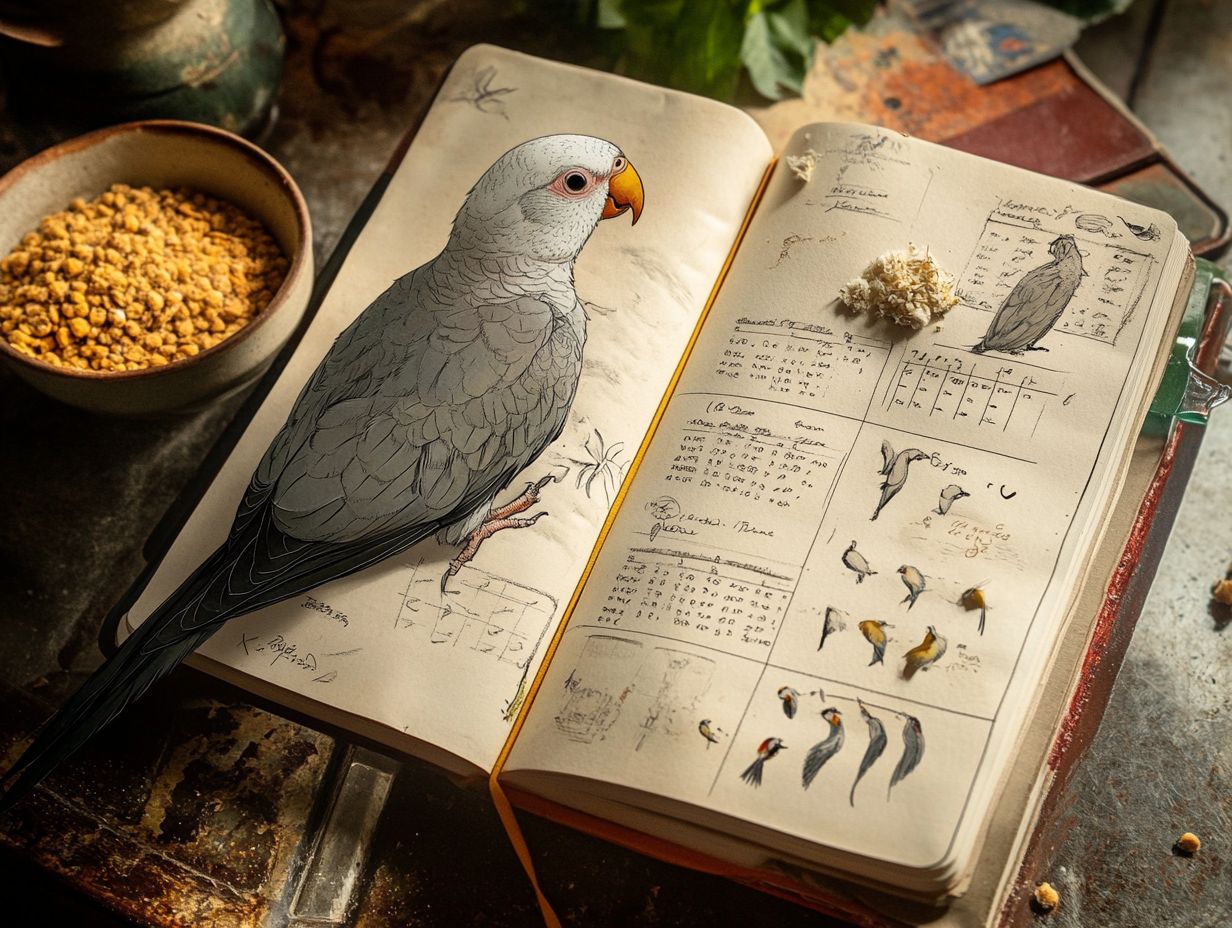
- Understand your bird’s dietary needs based on its type and nutritional requirements, including the best options for pellets and seeds.
- Create a balanced diet for your bird with essential nutrients and food options.
- Consider your bird’s age, size, and activity level when creating a feeding schedule.
Understanding Your Bird’s Dietary Needs
Grasping your bird’s dietary needs is essential for ensuring its overall health and happiness. Different species, including parrots, can thrive when you offer a variety of fresh foods and safe pellets.
Consulting a veterinarian who specializes in birds can provide invaluable insights into crafting the ideal diet tailored to your bird’s specific species. This typically encompasses a balanced mix of fresh fruits, vegetables, high-quality pellets, and seeds. Establishing daily feeding routines will not only promote optimal health and prevent illness but also allow you to make any necessary seasonal dietary adjustments with ease.
Types of Birds and Their Nutritional Requirements
Different types of birds, such as parrots, finches, and canaries, come with unique nutritional needs that you must consider meticulously when crafting their diets.
For example, while parrots thrive on a varied menu of fruits, vegetables, and specially formulated pellets that provide essential vitamins and amino acids, finches prefer a diet primarily centered around seeds especially grass seeds paired with fresh greens for optimal health.
Canaries, in contrast, benefit from a mix of seeds and the occasional fruit, but it’s crucial to avoid high-fat options. By incorporating supplements like calcium and vitamin-rich powders, you can significantly enhance their health, catering to the specific dietary preferences and overall well-being of each bird species.
Creating a Balanced Diet for Your Bird
Crafting a balanced diet for your bird is vital for fostering its health and happiness, ensuring it receives the essential nutrients for optimal well-being. A thoughtfully structured diet should encompass a variety of high-quality pellets, seeds, and an array of fresh foods, including fruits and vegetables.
Each food type serves a pivotal role in sustaining energy levels, bolstering the immune system, and warding off illness. By diversifying the diet, you also offer mental stimulation through a range of textures and flavors, promoting healthy eating habits and overall contentment.
Essential Nutrients and Food Options
Essential nutrients for your birds include proteins, vitamins, and minerals, along with safe food options like pellets, seeds, fruits, and vegetables that contribute to their well-being.
These nutrients are vital for maintaining the health and vitality of your avian companions, supporting everything from feather production to immune function. For example, proteins are important for growth and tissue repair, while vitamins A, D, and E play significant roles in vision, bone health, and reproductive success, respectively. Minerals such as calcium are crucial for strong bones and effective egg production.
Incorporating leafy greens and fruits enhances hydration and provides much-needed antioxidants. To further elevate their nutrition, consider vet-recommended supplements like omega-3 fatty acids, which are important for heart health and brain function, and probiotics. Always adhere to safe food practices to avoid any harmful options.
Factors to Consider When Creating a Feeding Schedule
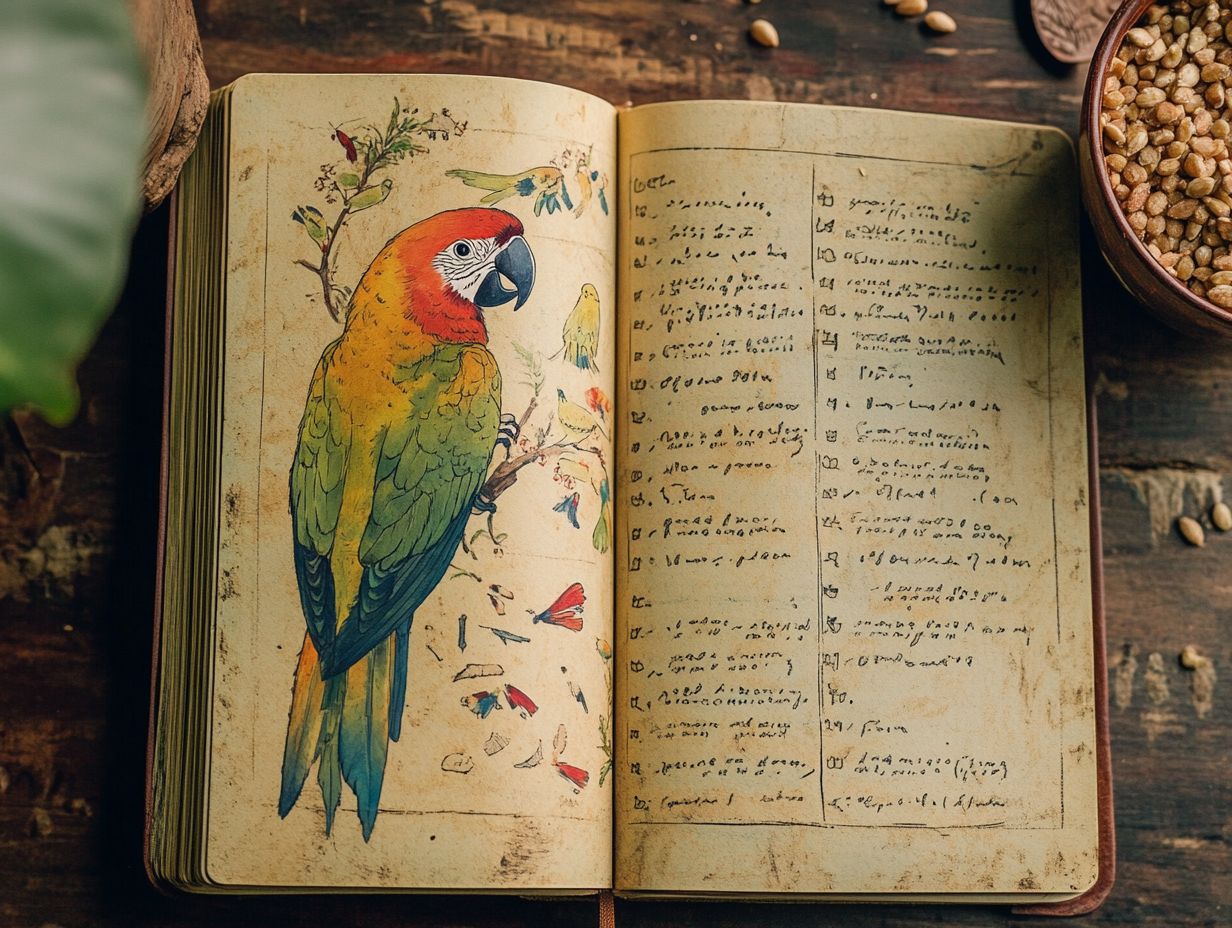
When you create a feeding schedule for your bird, consider several key factors, such as age, size, and activity level. Additionally, it’s important to determine the best time to feed your pet bird and consider the environment it lives in to ensure it receives the proper nutrition and care it deserves.
Younger birds usually need to be fed more often than adults. Larger species, like parrots, have different dietary needs than smaller birds. An active bird often requires additional calories to sustain its energy, influencing both the type and quantity of food you provide.
Personalizing the feeding schedule to meet your bird’s unique needs is crucial for promoting its long-term health and happiness. This also ensures they have adequate socialization and exercise.
Age, Size, and Activity Level of Your Bird
The age, size, and activity level of your bird are crucial in determining its dietary needs and overall health. These factors should be regularly checked during vet visits.
For example, a young parakeet needs higher protein content to support its growth. In contrast, an older bird may require more fiber to aid digestion. Larger species, like macaws, thrive on larger pellets and a diverse array of fruits that provide essential vitamins. Smaller birds, such as finches, may do well on a seed-based diet but will benefit from incorporating vegetables and occasional treats.
Understanding these differences helps ensure each species gets the right nutrients. This is vital for their health and preventing issues. Consulting with a veterinarian can offer you tailored dietary recommendations that align perfectly with your bird’s specific needs.
Sample Feeding Schedule for Different Types of Birds
A well-crafted feeding schedule tailored for various bird species can greatly enhance their daily routine. This ensures they receive the proper nutrition needed for optimal health, including safe foods that guard against toxins.
For example, parrots thrive on two meals a day, incorporating a mix of pellets, seeds, and fresh fruits. In contrast, smaller birds like finches may benefit from three smaller meals spread throughout their day.
Adjust portion sizes according to each species and their unique requirements. This fosters a balanced nutrient intake while preventing overfeeding and ensuring they have access to clean water.
Daily Meal Plan and Portion Sizes
A well-structured daily meal plan featuring appropriate portion sizes is essential for maintaining your bird’s health. It ensures they receive the optimal balance of nutrients throughout the day, while also considering seasonal changes in diet.
This meticulous focus on dietary needs significantly impacts your bird’s overall well-being. It boosts energy levels, enhances plumage condition, and promotes longevity. For example, a diverse diet that incorporates seeds, fresh fruits, and vegetables can meet the specific nutritional requirements of various species, such as parrots or canaries.
Offer just the right amounts, as overfeeding can lead to obesity and associated health concerns. Tailoring each meal not only to the specific type of bird but also considering its age and activity level fosters an enriched and vibrant life for your feathered companion.
Tips for Maintaining a Healthy Feeding Schedule
Stick to a healthy feeding schedule for your bird. Consistency and regular monitoring help meet its dietary needs and uphold optimal health. Additionally, creating a reward system for your bird can foster good eating habits and establish a reassuring sense of security for your feathered companion.
Routine health checks are vital for spotting potential issues early. This enables you to make necessary adjustments to its diet or feeding schedule. Regular assessments should include monitoring weight changes and any signs of illness, which may signal the need for dietary modifications.
Consistency and Monitoring Your Bird’s Health
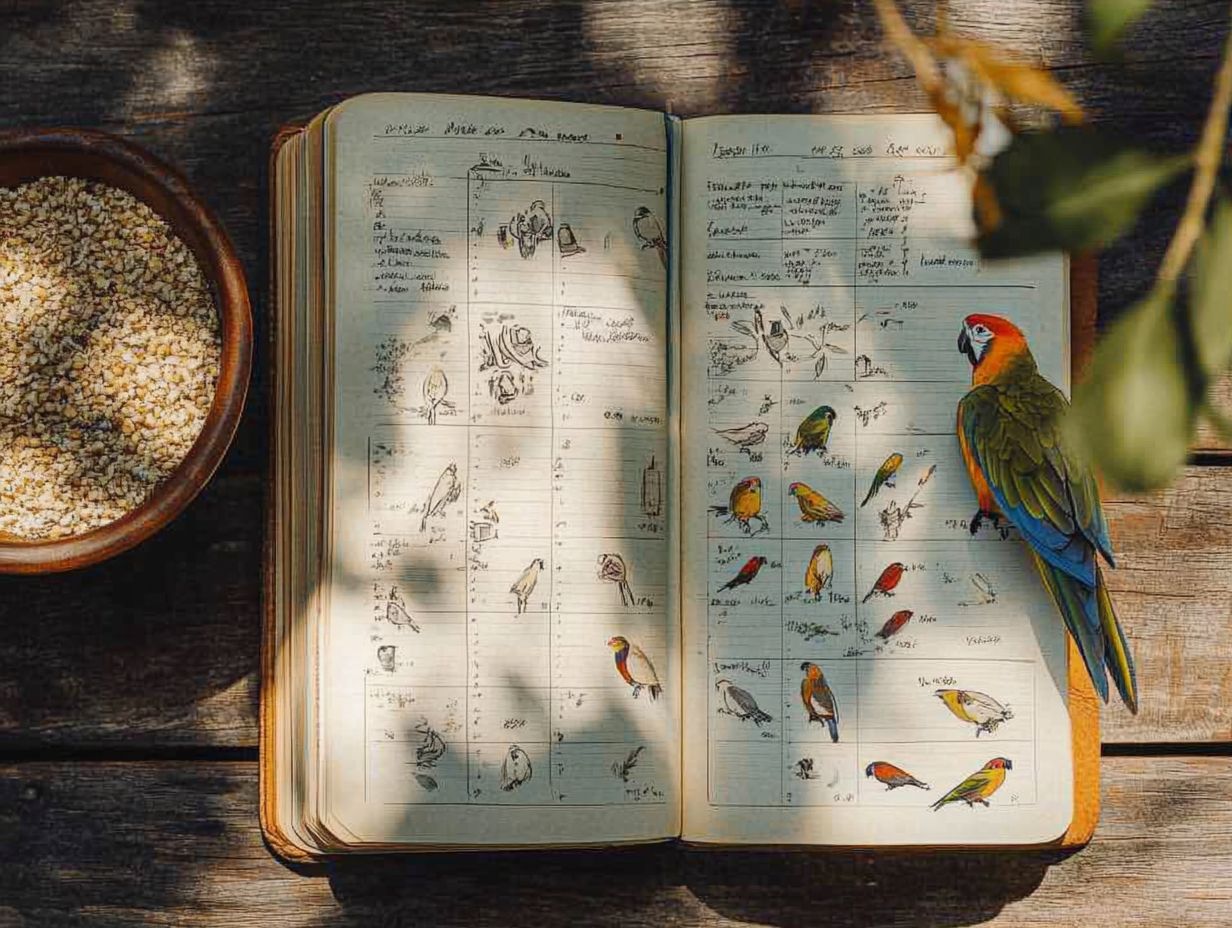
Consistency in feeding routines and monitoring your bird’s health are essential for ensuring their long-term well-being and happiness.
Establishing a regular feeding schedule helps your feathered friend adapt to a routine that promotes healthy digestion and energy use. This structured approach prevents overindulgence and allows you to notice any changes in appetite or behavior that might indicate health issues.
Regular health checks like monitoring weight, droppings, and feather quality are crucial for early detection of illnesses. Paying attention to signs of distress, such as fatigue or less vocalization, can provide vital clues. Act quickly to ensure your bird enjoys a healthier, more vibrant life.
Common Mistakes to Avoid When Feeding Your Bird
Avoiding common mistakes in feeding your bird is vital for maintaining its health and preventing potential illnesses linked to unsafe foods and poor feeding habits, such as offering anything containing Teflon, lead, or zinc.
Many bird owners may unintentionally offer harmful foods, like avocados or chocolate, leading to serious health issues. Relying too heavily on seeds can lead to nutritional deficiencies since it’s important to introduce a variety of pellets, fruits, and vegetables.
Being aware of these pitfalls is essential. Daily supervision and care can greatly enhance your bird’s health and keep them joyful and vibrant.
Unsafe Foods and Feeding Habits
Certain unsafe foods pose significant risks to your bird’s health and should be strictly avoided, especially those containing harmful toxins, such as lead and zinc.
As a pet owner, you must be vigilant about what you offer your feathered friend. Some seemingly innocent foods can be harmful. For instance, chocolate, avocado, and caffeine can cause severe health issues or even tragic outcomes. Additionally, high-salt snacks, like chips or processed meats, can lead to dehydration and kidney problems in birds. Always consider adding fresh foods to your bird’s diet.
Instead, focus on providing healthier alternatives. Fresh fruits like apples and bananas, alongside vegetables such as carrots and leafy greens, promote a balanced diet and support overall health. Adding nutritional supplements to their diet can further enhance their well-being. Ensuring a nutrient-rich diet significantly improves their vitality and longevity.
Frequently Asked Questions
What is a feeding schedule for a bird?
A feeding schedule for a bird is a planned routine about when and how often you feed your bird throughout the day. It ensures your bird receives proper nutrition and helps maintain their health and well-being, promoting a consistent routine.
Why is it important to create a feeding schedule for my bird?
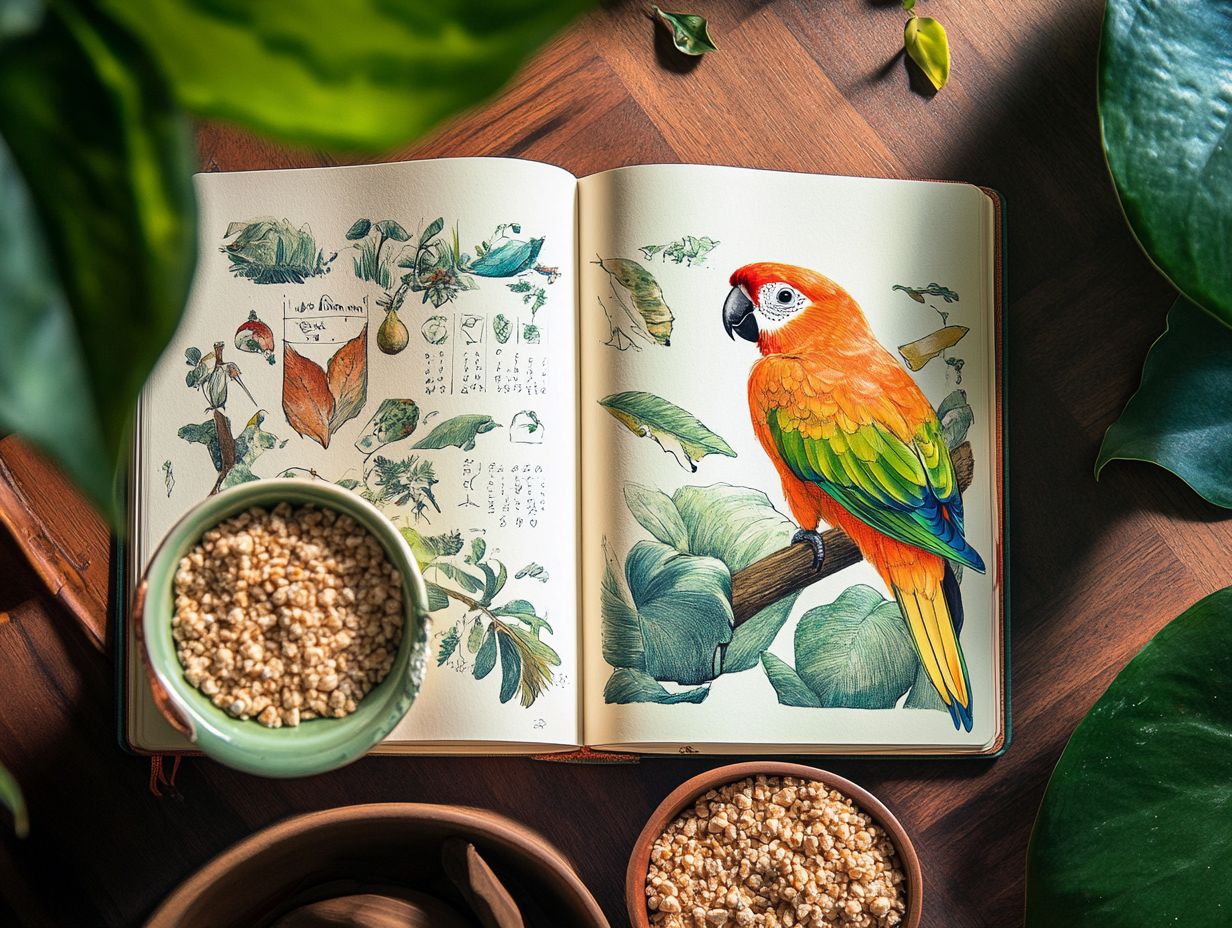
Creating a feeding schedule for your bird is important because it regulates their eating habits and prevents overeating, which can lead to obesity and other health problems. Additionally, establishing a routine for your bird allows you to monitor their food intake and adjust their diet as needed. Regular health checks help identify any signs of illness.
How do I determine how much and how often to feed my bird?
The amount and frequency of feeding for your bird depend on their species, age, and activity level. Consult with an avian veterinarian (a vet specialized in birds) or research your specific bird’s dietary needs. Generally, most birds should have access to food and fresh water at all times, with specific meals or treats given at designated times.
Call to Action: Start implementing a feeding schedule today and closely monitor your bird’s health for a happier, healthier life!
What types of food should I include in my bird’s feeding schedule?
Birds have specific food needs. Their diet should include a variety of seeds, pellets, fruits, vegetables, and occasional protein sources like eggs or mealworms.
Consider seasonal variations in available foods as well. Consult a veterinarian or research your bird’s dietary requirements to ensure a balanced, nutritious diet.
Can I create a feeding schedule for my bird if I have a busy schedule?
Yes! You can create a feeding schedule even with a busy lifestyle. Use automatic feeders or portion control bowls to ensure your bird gets food at the right times.
You can prep and store meals in advance for convenience and to maintain their feeding routine.
What should I do if my bird’s eating habits change?
If you notice any changes, don t wait. Consult a vet right away! A change in eating habits, like decreased appetite or overeating, could indicate health issues or dietary deficiencies.
Always seek professional advice regarding your bird’s health and well-being, especially for signs of illness.

